Please Take Note: This is a review of the final game, but it might change slightly based on the success of the Kickstarter campaign. The game is being reviewed on the components and the rules provided with the understanding that “what you see is not what you might get” when the game is published. If you like what you read and want to learn more, we encourage you to visit the game publisher’s website or visit the Kickstarter campaign. Now that we have all that disclaimer junk out of the way, on with the review.
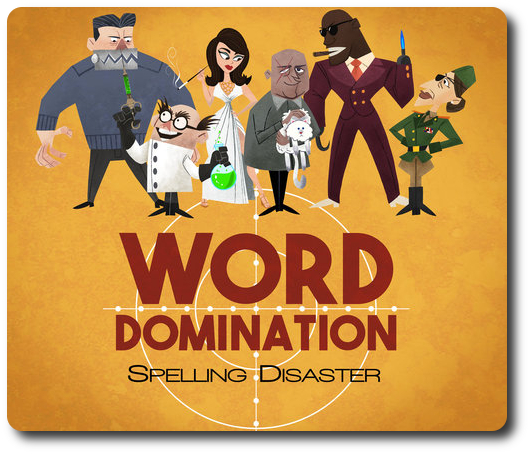
The Basics:
- For ages 8 and up (publisher suggests 12+)
- For 2 to 4 players
- Approximately 45 minutes to complete
Geek Skills:
- Counting & Math
- Logical & Critical Decision Making
- Reading
- Strategy & Tactics
- Risk vs. Reward
- Hand/Resource Management
- Bluffing and Misdirection
Learning Curve:
- Child – Easy
- Adult – Easy
Theme & Narrative:
- Victory will only go to those who can spell it
Endorsements:
- Gamer Geek approved!
- Parent Geek approved!
- Child Geek approved!
Overview
It has been said that the greatest evil masterminds in history were also really good at Spelling Bees. If such is the case, the government should be carefully watching who wins these contests. In this game, you will spell your way to world domination, leaving your competition in the D – U – S – T.
Word Domination, designed by Jeff Beck and to be published by Uproarious Games, will reportedly be comprised of 6 Player cards, 105 Letter tiles, 120 cubes (in 4 different colors, 30 per player), and 1 Turn counter. As this is a review of a prepublished game, I cannot comment on the game component quality. The illustrations by Ryan Goldsberry, that portray the different villains the players will take control of, are highly stylized and colorful.
How to Take Over the World: Step 1 – Get Yourself Organized
To set up the game, first shuffle the Letter tiles and then deal them face-up to the table to create a grid. The grid size will be based on the number of players. For example, a 2-player game will have a 4×4 grid, while a 4-player game will have a 5×6 grid. Place the unused Letter tiles back in the game box.
Second, each player takes a turn drawing 1 Letter tile at random from the game box. This is the player’s Letter tile and it should be kept in the player’s hand.
Third, have each player select 1 Player card and take all the cubes of a single color.
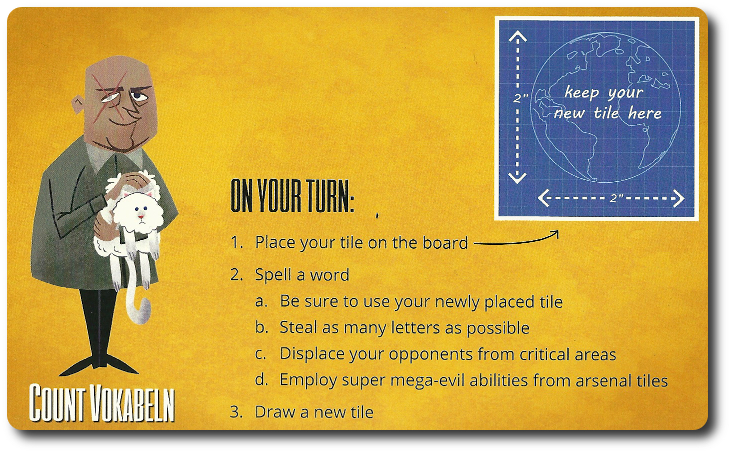
That’s it for game set up. Time to fleece the world and take it over one letter at a time!
How to Take Over the World: Step 2 – Use the Proper Vocabulary
Word Domination is played in rounds and turns, for a total of 6 rounds. On a player’s turn, they will complete 3 actions. Each of the actions is summarized here.
Action 1: Place a Letter Tile
The player’s first action is to take the Letter tile in their hand and placing it anywhere outside of the grid. The Letter tile must be adjacent to at least 1 other Letter tile in the grid (i.e. not diagonal). The goal here is to place the Letter tile so it will help you spell a word, which is the player’s second action.
Action 2: Spell a Word
The player now takes their cubes and places them on the Letter tiles (including the 1 Letter tile they placed during Action 1) that will create a word. The Letter tiles need not be adjacent or diagonal to each other. Each Letter tile can only be used once and Letter tiles that have been previously stolen are no longer available.
Thematically speaking, players are attempting to capture priceless and highly technical “Artifact” Letter tiles (dark blue) that will help them take over the world. Every Letter tile is a portion of that goal. A full word created by Letter tiles is considered 1 attempt to do evil. The light blue Letter tiles are considered weapons and gear, collectively referred to as “Arsenal” Letter tiles. But more on that later…
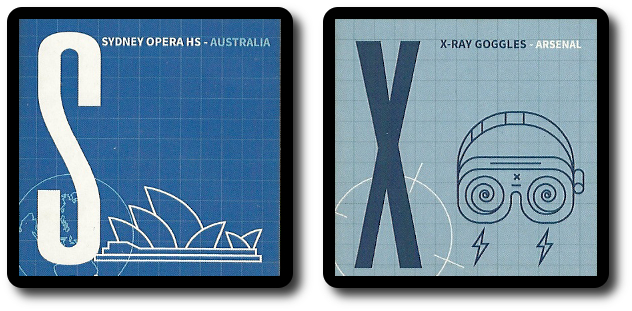
Stealing Letters
Stealing Letter tiles is the best and most effective way of winning the game and irritating the snot out of your opponents. A Letter tile is stolen by using it when it already has one cube that belongs to the player. As such, the first time a player places a cube on a Letter tile, it signifies to the player’s opponents that the player wants it. A second cube means the player now owns it (stole it).
Stealing is as much an art as it’s a brutal display of control. Players can “bump” other opponent’s from letters. In all cases, players cannot use the same Letter more than once on a single turn. This means a single Letter tile could, in theory, be contested multiple times. But that’s OK, and a player should attempt to steal as many Letter tiles as possible, as doing so reduces the probability of the player’s opponents winning the game. Plus, it’s exactly the kind of thing a villain would do. So, you know…. “When in Rome” and all that…
Once a Letter tile is stolen, it’s taken from the grid and placed in front of the player who now owns it. A new Letter tile is randomly drawn and replaces the removed Letter tile, but it’s placed face-down instead, indicating that it was stolen. The player then adds a cube to it, which will award them infamy points at the end of the game.
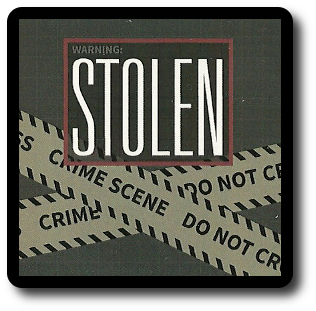
Stolen Letter tile are now off-limits to all opponents except the player. They may continue to use them for spelling words, but do not add any additional points for doing so.
Villainous Valor
If the player thinks it’s a good idea, they can help an opponent spell words on their opponent’s turn and receive a “cut” of the reward. This is done by attempting to make a deal with the opponent on their turn without telling them what the word is. If they agree to accept the player’s help, the player gets to keep 1 Letter tile as payment. It’s then used in the same way as a stolen Letter tile.
Diabolical Displacement
When placing cubes, players should take advantage of opportunities to displace opponents’ cubes from the grid. This will make it harder for their opponents to spell words going forward and give the player greater grid control.
Be Evil, Baby
“Arsenal” Letter tiles provide the player who either currently controls them or has stolen them, special abilities that can be used on their turn. “Arsenal” Letter tiles must be used for their ability on the same turn they are claimed. Examples of some of the abilities include the following:

- Force Reactor (“F” Letter tile): Replace any unclaimed Letter tile with a random Letter tile from the game box.
- Krypton Blaster (“K” Letter tile): Draw a Letter tile from the game box and give it to an opponent. The opponent must use the given Letter tile and their current Letter tile in hand on their turn or lose their turn.
- X-Ray Goggles (“X” Letter tile): Place a cube on any Letter tile you did not use this turn. If you place a cube on a Letter tile that already has your cube on it, the Letter tile is stolen!
Action 3: Draw a New Letter Tile
The player’s final action is to draw a new Letter tile at random from the game box.
This completes the player’s turn. The next player in turn order sequence now goes. Once all players have had a turn, the round is completed and a new round begins.
How to Take Over the World: Step 3 – Count Your Blessings and Bombs
After the last player has gone and completes round 6, players now count their points to determine who won the game.
- Each stolen Letter tile in the grid is worth +1 Infamy point
- Adjacent stolen Letter tiles in the grid comprised of 3 or more are worth +1 more Infamy points (for a total of 2 each)
The player with the most points wins the game.
To learn more about Word Domination, visit the game publisher’s website or visit the Kickstarter campaign.
Final Word
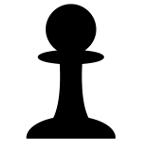 The Child Geeks quickly grasped the game’s most basic concepts and got to it. According to one Child Geek, “This game is all about grabbing the letters before others can. To do that, you need to be able to spell lots of different words.” Which the majority of the Child Geeks were able to do. There were a few times where none of the Child Geeks were able to spell any words at all, but these occurrences were few in number. The majority of the time was spent fighting over letters and getting points. One Child Geek said, “The most fun part of this game is stealing letters from others. I love watching the other players’ faces when I take their points!” As evil as it may sound, the Child Geeks exceeded my expectations and truly demonstrated their ability to be the next generation Super Villains. All the Child Geeks voted to approve Word Domination.
The Child Geeks quickly grasped the game’s most basic concepts and got to it. According to one Child Geek, “This game is all about grabbing the letters before others can. To do that, you need to be able to spell lots of different words.” Which the majority of the Child Geeks were able to do. There were a few times where none of the Child Geeks were able to spell any words at all, but these occurrences were few in number. The majority of the time was spent fighting over letters and getting points. One Child Geek said, “The most fun part of this game is stealing letters from others. I love watching the other players’ faces when I take their points!” As evil as it may sound, the Child Geeks exceeded my expectations and truly demonstrated their ability to be the next generation Super Villains. All the Child Geeks voted to approve Word Domination.
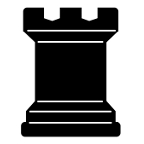 The Parent Geeks liked the game even more than their children, finding Word Domination to be an entertaining exercise in spelling and timing. According to one Parent Geek, “You don’t necessary want to spell every word you see. You have to decide which is the best to spell now and which is best to spell letter, making sure letters overlap.” It was the strategic spelling that the Parent Geeks liked the most, which allowed them to play a game of vocabulary like it was a Wargame. As one Parent Geek put it, “What I like most about this game is not the spelling or ever the use of the Arsenal tiles. What I like most is the deep thinking you have to put into your turn and thinking when to spell simple words. I have never thought so hard and so long about when to spell “CAT” before.” When the games were over, the Parent Geeks voted to approve Word Domination.
The Parent Geeks liked the game even more than their children, finding Word Domination to be an entertaining exercise in spelling and timing. According to one Parent Geek, “You don’t necessary want to spell every word you see. You have to decide which is the best to spell now and which is best to spell letter, making sure letters overlap.” It was the strategic spelling that the Parent Geeks liked the most, which allowed them to play a game of vocabulary like it was a Wargame. As one Parent Geek put it, “What I like most about this game is not the spelling or ever the use of the Arsenal tiles. What I like most is the deep thinking you have to put into your turn and thinking when to spell simple words. I have never thought so hard and so long about when to spell “CAT” before.” When the games were over, the Parent Geeks voted to approve Word Domination.
 The Gamer Geeks were skeptical at first, having found most games that deal with language to be lacking much in the way of interesting game play. Their concerns were completely washed away after 5 minutes of playing the game. According to one Gamer Geek, “No way. No, freaking way! I cannot believe how much I am enjoying this game!” Another Gamer Geek said, “An excellent blend of strategy, tactics, vocabulary, and just plain fun. I am really enjoying it.” All of the Gamer Geeks enjoyed it, too, finding no faults whatsoever other than the games tended to end sooner than they would have liked. When the votes were in, the Gamer Geeks fully approved Word Domination.
The Gamer Geeks were skeptical at first, having found most games that deal with language to be lacking much in the way of interesting game play. Their concerns were completely washed away after 5 minutes of playing the game. According to one Gamer Geek, “No way. No, freaking way! I cannot believe how much I am enjoying this game!” Another Gamer Geek said, “An excellent blend of strategy, tactics, vocabulary, and just plain fun. I am really enjoying it.” All of the Gamer Geeks enjoyed it, too, finding no faults whatsoever other than the games tended to end sooner than they would have liked. When the votes were in, the Gamer Geeks fully approved Word Domination.
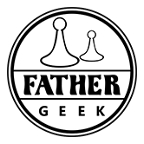 Just when I thought the game designers of the world couldn’t possible create a spelling game with a new twist, Mr. Jeff Beck approaches me with Word Domination. I was very pleased with the game’s simplistic play and surprised at how much tactical and strategical thought I had to put into spelling my words. It was more than just a game of seeing who had a larger vocabulary. This was a game of subtle placement of “possible” ownership of letters. I say “possible”, because a player quickly learns that subterfuge and bluffing is a key element in the game. Everyone wants the same tiles, but not everyone is going after the same tiles at the same time. You can force your opponent’s hand to get bigger words and capture the all important “Arsenal” Letter tiles to get the upper hand.
Just when I thought the game designers of the world couldn’t possible create a spelling game with a new twist, Mr. Jeff Beck approaches me with Word Domination. I was very pleased with the game’s simplistic play and surprised at how much tactical and strategical thought I had to put into spelling my words. It was more than just a game of seeing who had a larger vocabulary. This was a game of subtle placement of “possible” ownership of letters. I say “possible”, because a player quickly learns that subterfuge and bluffing is a key element in the game. Everyone wants the same tiles, but not everyone is going after the same tiles at the same time. You can force your opponent’s hand to get bigger words and capture the all important “Arsenal” Letter tiles to get the upper hand.
Regarding the “Arsenal” Letter tiles, wow. Word Domination feels like Scrabble if Scrabble was a Wargame. There is a lot of surprising aggressive play for a Word game, complete with ducking, dodging, and blatant attacking. It created a very engaging experience, where the spelling aspect of the game play just became something in the background in the same way moving armies around a game board just becomes a means to an end.
An individual with a larger vocabulary and better spelling skills will always win. Take this into account before playing the game with highly mixed skill and education backgrounds. For example, a game with adults playing with young Child Geeks is going to feel highly one-sided. This is important to recognize for two reasons. First, the game is as challenging as your opponent, much like Chess. Second, the game grows with the player. A 10-year-old player can play Word Domination and have a completely different game playing experience when they play it again when they are 15-years-old. It all comes down to vocabulary and spelling ability.
I was very pleased with Word Domination. It takes a simple and overly done game playing concept and turns it on its head. This is the first Word game I have ever played where I felt threatened, incredibly angry, and evilly pleased with myself. It’s a game that has real depth and tremendous replay value. Aggressive players will feel right at home, but so too will the deep thinkers. Do try Word Domination when time allows. You’ll like what you find.
This is a paid for review of the game’s final prototype. Although our time and focus was financially compensated, our words are our own. We’d need at least 10 million dollars before we started saying what other people wanted. Such is the statuesque and legendary integrity of Father Geek which cannot be bought except by those who own their own private islands and small countries.



